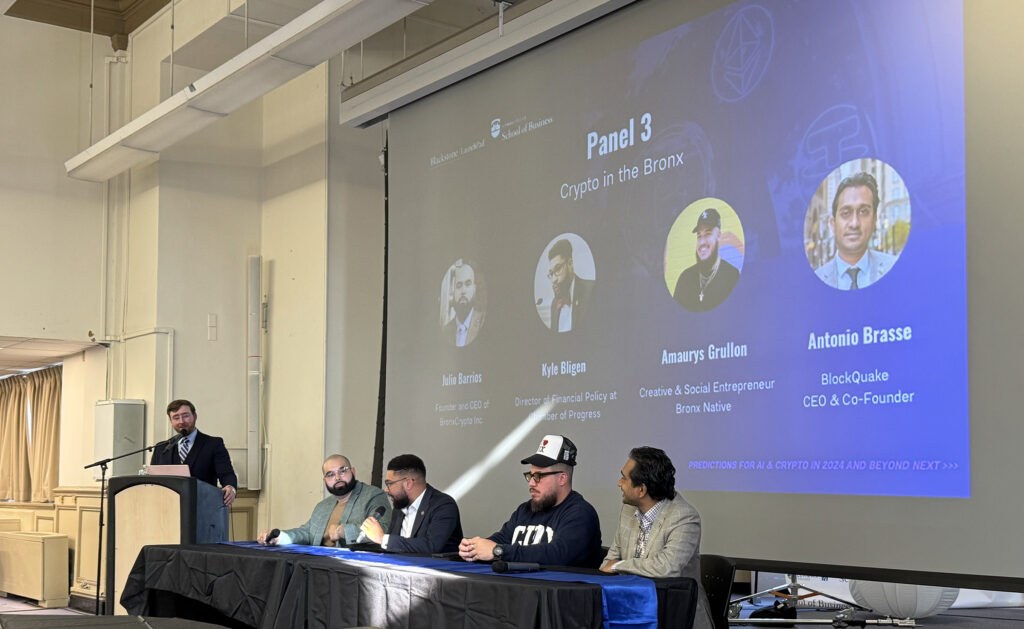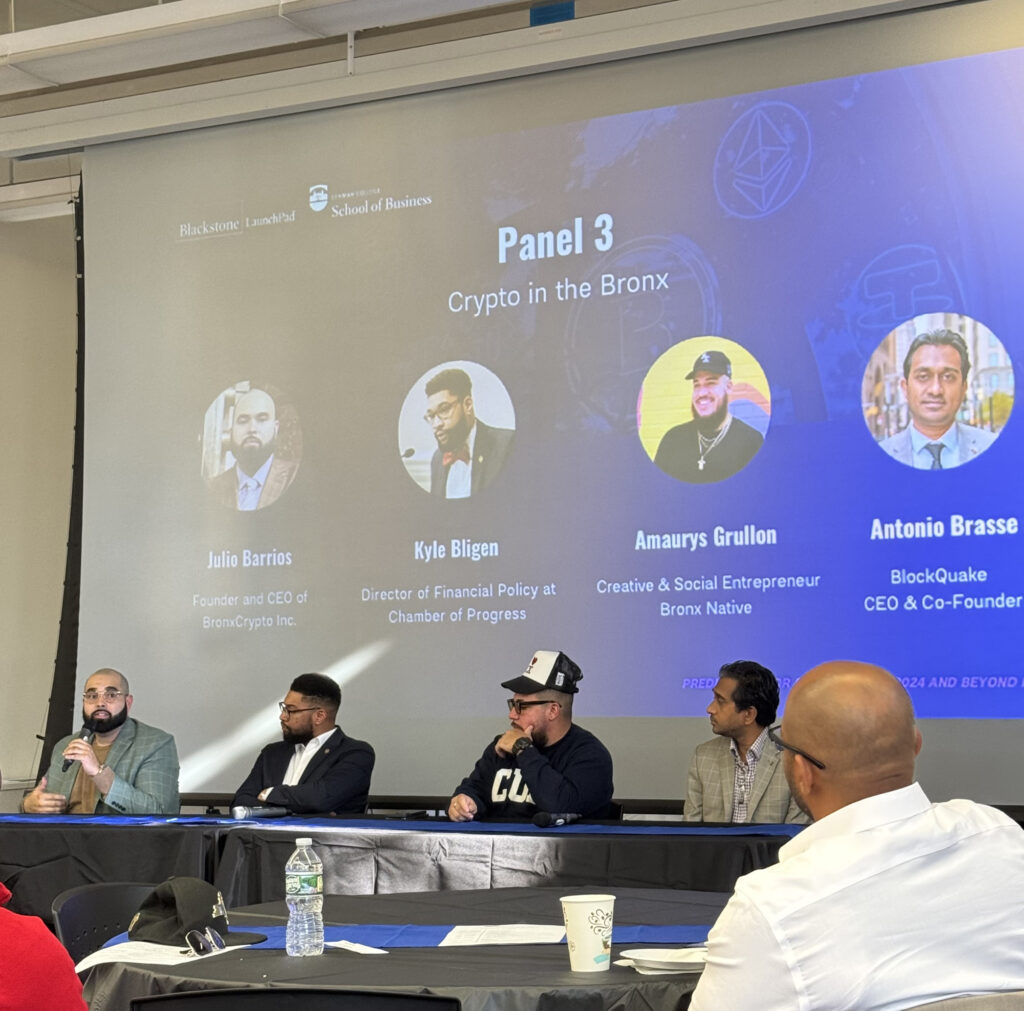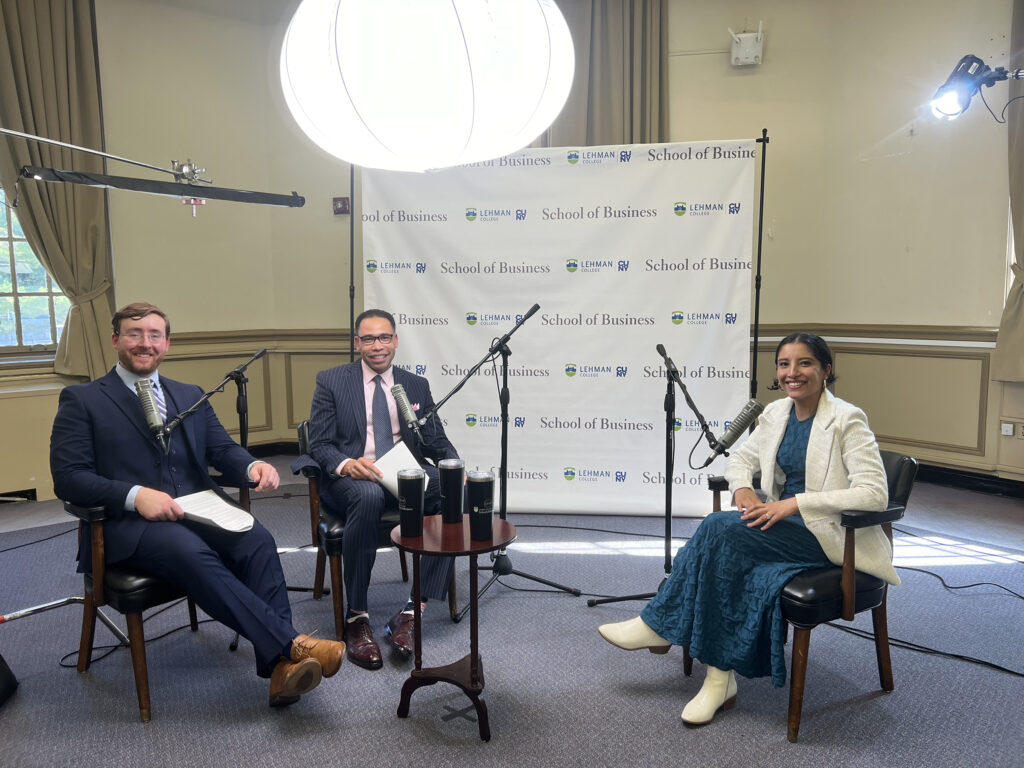
Photo courtesy of J Strategies
Lehman College’s School of Business hosted its 2nd Annual Digital Assets Conference on Oct. 23 at the College, bringing together industry experts, local entrepreneurs, and students to explore blockchain, cryptocurrencies, artificial intelligence, and the impact these technologies are having on society.
According to Amazon, Blockchain technology is an advanced database mechanism that allows transparent information sharing within a business network. According to Investopedia, a cryptocurrency is a digital or virtual currency secured by cryptography, which makes it nearly impossible to counterfeit or double-spend. According to Fortinet, cryptography is the process of hiding or coding information so that only the person a message was intended for can read it. According to IBM, it uses coded algorithims to protect and obscure transmitted information.
According to Google Cloud, artificial intelligence is a set of technologies that enable computers to perform a variety of advanced functions, including the ability to see, understand and translate spoken and written language, analyze data, make recommendations, and more.
“Blockchain and AI are going to transform every aspect of the economy, which makes the Digital Asset Conference and our educational efforts here at Lehman so important,” said Sean Stein-Smith, Lehman College associate professor of accounting. “Crypto, AI, and other emerging technologies are often discussed in silos, but the reality is that they impact and influence each other every single day.”
Ron Quaranta, chairman and CEO of the Wall Street Blockchain Alliance, delivered the keynote address at the event, highlighting the role blockchain is playing in transforming traditional financial services. This was followed by the first panel discussion, “Crypto Trends & Updates,” which included insights from industry leaders like Zachary Gordon, founder of Red Five accounting firm, and Peter C. Earle of the American Institute for Economic Research.

Photo courtesy of J Strategies
Later, the “Crypto in the Bronx” panel delved into the role of digital assets and pro-innovation government policymaking in empowering communities and local entrepreneurs in The Bronx. According to Gartner, a digital asset is anything that is uniquely identifiable and stored digitally that organizations can use to realize value.
“The existing financial system leaves people out,” said Julio Barrios, founder and CEO of BronxCrypto. “Cryptocurrencies and blockchain are tools for financial literacy and independence. I want to make sure communities in The Bronx, people who look like me, are benefiting from these technologies.”
Barrios showcased how he teamed up with Amaurys Grullon to create NFTs (non-fungible tokens) and make “Bronx Native” the first business in The Bronx to accept cryptocurrency. According to Amazon, non-fungible tokens, often referred to as NFTs, are blockchain-based tokens that each represent a unique asset like a piece of art, digital content, or media. An NFT can be thought of as an irrevocable digital certificate of ownership and authenticity for a given asset, whether digital or physical.
The panel also included regulatory and security expert Antonio Brasse, CEO of BlockQuake, and Kyle Bligen, director of financial policy at Chamber of Progress, for his perspective on policymaking at the state and federal level.
Lawrence Fauntleroy, Lehman College’s director of experiential learning, said, “There is so much raw talent in The Bronx, and shining a light on local entrepreneurs in this space is critical toward growing businesses and successes in The Bronx.”

Photo courtesy of J Strategies
AI’s growing influence on finance was also a hot topic. In the “How AI Is Changing Business & Finance” session, panelists such as Nami Bural, CEO of Niural, discussed how machine learning and data analysis are reshaping financial services. During the final panel discussion, “Predictions for AI & Crypto in 2024 and Beyond,” experts forecasted the continued integration of AI and blockchain across various industries and emphasized the need for informed policymaking from elected leaders.
The conference focused on the potential of digital assets to transform business and society, and highlighted the role The Bronx has as a growing center of innovation. Lehman officials said that by connecting community leaders, industry experts, and students, the College supports a more inclusive and future-focused economy.
In other related news, as reported in the News Briefs section (Page 7) of our Sept. 19, 2024 print edition, Democratic Congressman Ritchie Torres (NY-15), who represents a large section of The Bronx, stretching from the northwest to the South Bronx, recently wrote to the U.S. Commodity Futures Trading Commission (CFTC) to call for the regulation of political election betting on the stock market. Axios had reported that stock market (futures) trading in investment bets on the outcome of political elections, had recently been declared legal in the U.S., though an appeals court blocked their availability for the time being.
Torres encouraged the CFTC to embrace the apparent growth in regulated election betting and to work with regulated parties to facilitate trading in these types of investments, rather than seeking to block their use by investors via the courts. He said the CFTC’s efforts would be better spent working with regulated registrants to promote election integrity and protect consumers from what he said were “the dangers posed by the widespread adoption of illegal and unregulated election markets.”
NBC recently reported that Polymarket, which offers bets in politics, among other sectors, said users spent more than $2.7 billion placing bets on the next U.S. president. Based on user bets, Polymarket said Trump’s odds of winning were roughly 65.5% and Harris’s were 34.5% as of Oct. 31.
According to the story, while people in the U.S. aren’t supposed to place their own bets, a Polymarket spokesperson said the platform could be useful for Americans because it acts as a live information source similar to the stock market. The story noted that advertisements for Polymarket didn’t explicitly encourage people in the U.S. to bet, but they also didn’t include a disclaimer about the regulation.
According to the story, a Polymarket spokesperson referred to a “misunderstanding” of the company, explaining that the stats displayed were not opinion polls but odds calculated by shares traded on Polymarket. The odds weren’t meant to reflect public opinion but reflect bettors’ level of confidence in either a Trump win or a Harris win according to Polymarket CEO Shayne Koplan.




